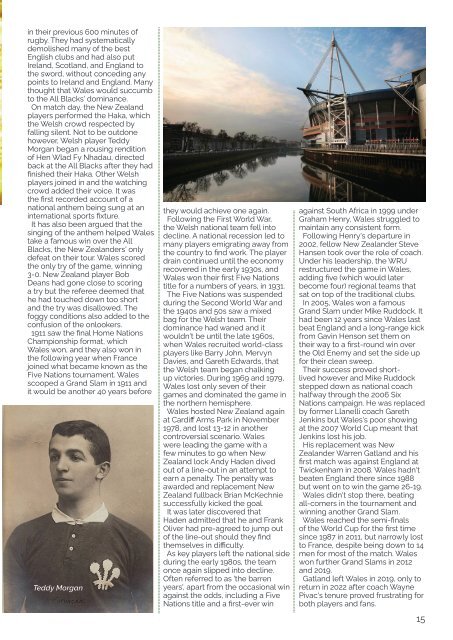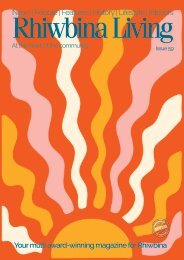Rhiwbina Living Issue 57
The 15 year anniversary issue of Rhiwbina Living, the award-winning magazine for Rhiwbina.
The 15 year anniversary issue of Rhiwbina Living, the award-winning magazine for Rhiwbina.
Create successful ePaper yourself
Turn your PDF publications into a flip-book with our unique Google optimized e-Paper software.
in their previous 600 minutes of<br />
rugby. They had systematically<br />
demolished many of the best<br />
English clubs and had also put<br />
Ireland, Scotland, and England to<br />
the sword, without conceding any<br />
points to Ireland and England. Many<br />
thought that Wales would succumb<br />
to the All Blacks' dominance.<br />
On match day, the New Zealand<br />
players performed the Haka, which<br />
the Welsh crowd respected by<br />
falling silent. Not to be outdone<br />
however, Welsh player Teddy<br />
Morgan began a rousing rendition<br />
of Hen Wlad Fy Nhadau, directed<br />
back at the All Blacks after they had<br />
finished their Haka. Other Welsh<br />
players joined in and the watching<br />
crowd added their voice. It was<br />
the first recorded account of a<br />
national anthem being sung at an<br />
international sports fixture.<br />
It has also been argued that the<br />
singing of the anthem helped Wales<br />
take a famous win over the All<br />
Blacks, the New Zealanders' only<br />
defeat on their tour. Wales scored<br />
the only try of the game, winning<br />
3-0. New Zealand player Bob<br />
Deans had gone close to scoring<br />
a try but the referee deemed that<br />
he had touched down too short<br />
and the try was disallowed. The<br />
foggy conditions also added to the<br />
confusion of the onlookers.<br />
1911 saw the final Home Nations<br />
Championship format, which<br />
Wales won, and they also won in<br />
the following year when France<br />
joined what became known as the<br />
Five Nations tournament. Wales<br />
scooped a Grand Slam in 1911 and<br />
it would be another 40 years before<br />
Teddy Morgan<br />
they would achieve one again.<br />
Following the First World War,<br />
the Welsh national team fell into<br />
decline. A national recession led to<br />
many players emigrating away from<br />
the country to find work. The player<br />
drain continued until the economy<br />
recovered in the early 1930s, and<br />
Wales won their first Five Nations<br />
title for a numbers of years, in 1931.<br />
The Five Nations was suspended<br />
during the Second World War and<br />
the 1940s and 50s saw a mixed<br />
bag for the Welsh team. Their<br />
dominance had waned and it<br />
wouldn't be until the late 1960s,<br />
when Wales recruited world-class<br />
players like Barry John, Mervyn<br />
Davies, and Gareth Edwards, that<br />
the Welsh team began chalking<br />
up victories. During 1969 and 1979,<br />
Wales lost only seven of their<br />
games and dominated the game in<br />
the northern hemisphere.<br />
Wales hosted New Zealand again<br />
at Cardiff Arms Park in November<br />
1978, and lost 13-12 in another<br />
controversial scenario. Wales<br />
were leading the game with a<br />
few minutes to go when New<br />
Zealand lock Andy Haden dived<br />
out of a line-out in an attempt to<br />
earn a penalty. The penalty was<br />
awarded and replacement New<br />
Zealand fullback Brian McKechnie<br />
successfully kicked the goal.<br />
It was later discovered that<br />
Haden admitted that he and Frank<br />
Oliver had pre-agreed to jump out<br />
of the line-out should they find<br />
themselves in difficulty.<br />
As key players left the national side<br />
during the early 1980s, the team<br />
once again slipped into decline.<br />
Often referred to as 'the barren<br />
years', apart from the occasional win<br />
against the odds, including a Five<br />
Nations title and a first-ever win<br />
against South Africa in 1999 under<br />
Graham Henry, Wales struggled to<br />
maintain any consistent form.<br />
Following Henry's departure in<br />
2002, fellow New Zealander Steve<br />
Hansen took over the role of coach.<br />
Under his leadership, the WRU<br />
restructured the game in Wales,<br />
adding five (which would later<br />
become four) regional teams that<br />
sat on top of the traditional clubs.<br />
In 2005, Wales won a famous<br />
Grand Slam under Mike Ruddock. It<br />
had been 12 years since Wales last<br />
beat England and a long-range kick<br />
from Gavin Henson set them on<br />
their way to a first-round win over<br />
the Old Enemy and set the side up<br />
for their clean sweep.<br />
Their success proved shortlived<br />
however and Mike Ruddock<br />
stepped down as national coach<br />
halfway through the 2006 Six<br />
Nations campaign. He was replaced<br />
by former Llanelli coach Gareth<br />
Jenkins but Wales's poor showing<br />
at the 2007 World Cup meant that<br />
Jenkins lost his job.<br />
His replacement was New<br />
Zealander Warren Gatland and his<br />
first match was against England at<br />
Twickenham in 2008. Wales hadn't<br />
beaten England there since 1988<br />
but went on to win the game 26-19.<br />
Wales didn't stop there, beating<br />
all-comers in the tournament and<br />
winning another Grand Slam.<br />
Wales reached the semi-finals<br />
of the World Cup for the first time<br />
since 1987 in 2011, but narrowly lost<br />
to France, despite being down to 14<br />
men for most of the match. Wales<br />
won further Grand Slams in 2012<br />
and 2019.<br />
Gatland left Wales in 2019, only to<br />
return in 2022 after coach Wayne<br />
Pivac's tenure proved frustrating for<br />
both players and fans.<br />
15

















